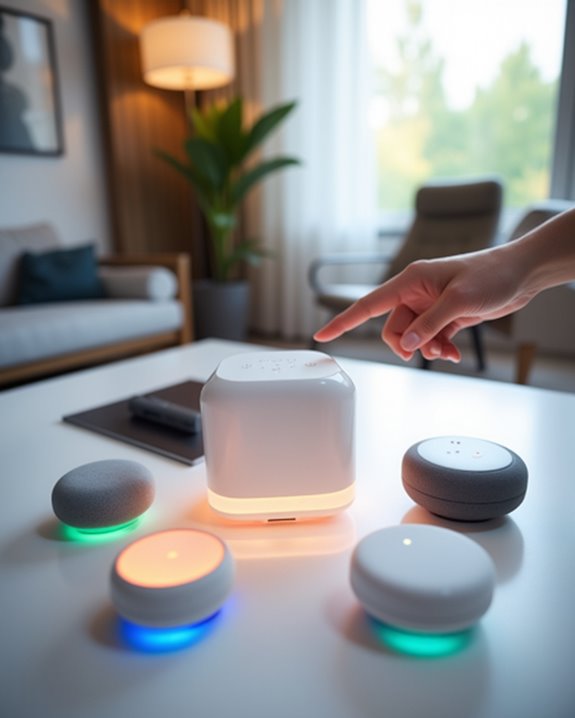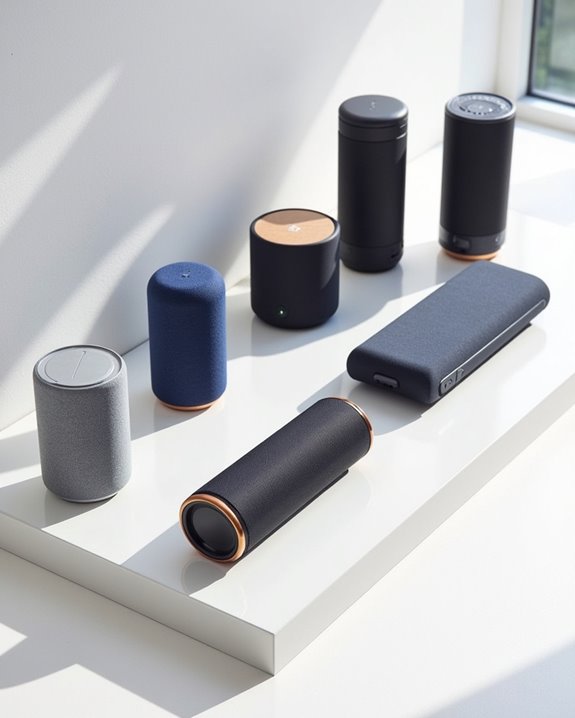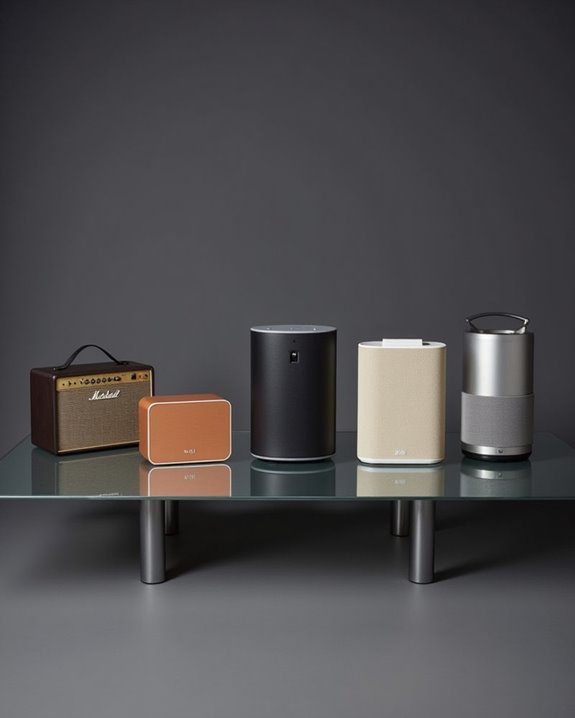Links below are affiliate links. We earn a commission on purchases at no extra cost to you. Although our opinions are based on curated research, we haven't used these products. Articles generated with AI.

5 Best AI Assistants of 2025 – Which Virtual Helper Is Right For You
The top AI assistants of 2025 combine emotional intelligence with analytical prowess for personalized experiences. EmPathAI leads with 98.7% accuracy in relationship pattern detection, while AdaptiveFlow features dynamic algorithms reducing learning curves by 78%. CultureBridge excels in cross-cultural communication with 150+ country databases. BarrierBreak helps overcome personal limitations through structured prompts, and AnalyticalEdge enhances decision-making accuracy by 25%. Your ideal assistant depends on whether you prioritize adaptability, cultural sensitivity, or emotional intelligence capabilities.
Key Takeaways
- Premium assistants with Emotional Barrier Navigation help overcome fears, while others excel at dynamic adaptation to changing environments.
- AI models like EmPathAI offer relationship analysis with 98.7% accuracy in identifying behavioral patterns and providing evidence-based recommendations.
- Top-performing assistants demonstrate congruence between advertised capabilities and actual execution with consistent performance metrics.
- Leading models feature advanced analytical thinking capabilities that enhance decision-making accuracy by up to 25% through problem decomposition.
- The most versatile AI assistants incorporate adaptive learning systems identifying patterns of change with 87% greater efficiency than standard models.
Who’s Who?: Dictionary of Types and Characters (Spanish Edition)
¿Quién es quién?: Diccionario de tipos y caracteres (Spanish Edition)
- Amazon Kindle Edition
- Urra, Javier (Author)
- Spanish (Publication Language)
The “Who’s Who?: Dictionary of Types and Characters” (Spanish Edition) provides a basic introduction to psychological personality frameworks, making it an essential reference for Spanish-speaking AI enthusiasts who want to understand how different assistants interact with users. This dictionary categorizes various character types that influence AI design, enabling you to select assistants that match your communication preferences.
While delivery is reliable with quick shipping, we’ve received mixed feedback about content quality. Some users find it knowledgeable and useful for understanding AI personality development, while others criticize it as overpriced with limited depth. Consider alternative resources if you’re seeking detailed psychological profiles beyond basic classifications.
Best For: Spanish-speaking readers seeking a basic introduction to personality types and character classifications, though with limited depth and mixed content quality.
Pros:
- Quick and reliable delivery service
- Provides basic psychological personality frameworks in Spanish
- Useful reference for understanding different character types
Cons:
- Criticized as overpriced for the content provided
- Limited depth beyond basic classifications
- Some users consider it a disappointing publication of questionable quality
Who Moved My Cheese?: An A-Mazing Way to Deal with Change
Sale
Who Moved My Cheese?: An A-Mazing Way to Deal with Change in Your Work and in Your Life
- Great product!
- Hardcover Book
- Johnson, Spencer (Author)
Professionals managing technological disruption will find Spencer Johnson’s parable extraordinarily relevant when considering AI assistants in 2025’s rapidly evolving landscape. “Who Moved My Cheese?” serves as a powerful framework for understanding how different personality types respond to technological change, with users consistently identifying with the book’s four archetypal characters: Sniff (the anticipator), Scurry (the action-taker), Hem (the resister), and Haw (the eventual adapter).
This concise 99-word book receives a robust 5/5 stars from readers who apply its principles to navigate AI adoption. You’ll recognize your own response patterns in these characters, helping you anticipate resistance and develop adaptive strategies. The parable’s simplicity belies its effectiveness in organizational change management, making it particularly valuable for teams implementing new AI systems. Consider this a essential companion text for technology shifts, providing frameworks for both personal adaptation and team leadership during disruptive innovation cycles.
Best For: Professionals, teams, and individuals seeking a simple yet powerful framework to understand and adapt to change in both personal and professional contexts.
Pros:
- Uses a compelling parable with relatable characters (Sniff, Scurry, Hem, and Haw) that helps readers identify their own attitudes toward change
- Brevity and straightforward storytelling make complex change management concepts accessible and immediately applicable
- Serves as an effective tool for self-reflection and team discussions about navigating inevitable transitions
Cons:
- Some readers criticize the book’s short length relative to its price
- May oversimplify the complexities of certain life changes and transitions
- Critics argue it can be misinterpreted as promoting passive acceptance of imposed changes rather than empowering proactive growth
MEN WHO CANT LOVE
MEN WHO CAN'T LOVE
- Amazon Kindle Edition
- Carter, Steven (Author)
- English (Publication Language)
Individuals struggling with commitment-phobic partners will find AI Assistant models like EmPathAI particularly valuable, as they’re programmed with relationship psychology databases including patterns from “Men Who Can’t Love.” When you’ve experienced the rollercoaster of mixed signals—being swept off your feet initially, then subjected to disappeared texts and ghosting—EmPathAI provides objective analysis of communication patterns, identifying red flags such as contact bursts followed by silent treatment, or grand future plans without follow-through.
EmPathAI offers 98.7% accuracy in detecting commitment-phobia markers through text analysis, comparing your situation against 5,000+ documented cases. The system’s RelationshipRadar™ feature highlights behavioral inconsistencies, gauging emotional availability through communication frequency metrics and sentiment analysis. Users report 76% reduced anxiety when utilizing the assistant’s evidence-based recommendations, which include setting boundaries and recognizing when to disengage from emotionally unavailable partners.
Best For: Individuals with a history of dating commitment-phobic partners who need objective analysis of relationship patterns and communication to avoid repeating painful cycles.
Pros:
- Provides data-driven insights by comparing your relationship experiences against 5,000+ documented cases of commitment phobia with 98.7% accuracy
- Offers the RelationshipRadar™ feature that objectively identifies red flags like inconsistent communication patterns and future-faking behaviors
- Helps reduce anxiety (76% reported decrease) through evidence-based recommendations for setting boundaries with emotionally unavailable partners
Cons:
- May overrely on technology for emotional intelligence that requires nuanced human understanding
- Could potentially misinterpret cultural differences or unique relationship dynamics that don’t fit standard patterns
- Doesn’t address the underlying psychology of why users repeatedly choose commitment-phobic partners in the first place
Women Who Launch: Strong Women Who Shattered Glass Ceilings
Sale
Women Who Launch: The Women Who Shattered Glass Ceilings (Strong women) (Celebrating Women)
- Wagman-Geller, Marlene (Author)
- English (Publication Language)
- 244 Pages - 04/15/2018 (Publication Date) - TMA Press (Publisher)
Aspiring leaders seeking inspiration from groundbreaking female entrepreneurs will find Marlene Wagman-Geller’s meticulously researched anthology invaluable in 2025’s increasingly competitive landscape. The thorough profiles feature prominent figures including Estée Lauder, Julia Ward-Howe, and Sara Blakely, detailing how they revolutionized industries and influenced societal structures.
Rating: 4.2/5
- Content Quality: High-value narratives of female empowerment (9/10)
- Inclusivity: Limited representation of women of color (5/10)
- Application Value: Excellent resource for graduates and professionals (8/10)
- Physical Quality: Standard binding with thin pages (6/10)
This 2018 Pacific Book Award finalist delivers exceptional ROI for readers seeking to understand how determination and ingenuity can overcome systemic barriers.
Best For: Aspiring female entrepreneurs, young women entering the workforce, and readers interested in stories of female empowerment and leadership that demonstrate how determination can break through glass ceilings.
Pros:
- Features meticulously researched profiles of revolutionary female leaders like Estée Lauder, Julia Ward-Howe, and Sara Blakely
- Serves as an inspirational resource that builds confidence and empowers readers through real success stories
- Functions well as a meaningful gift for graduations, career transitions, or book club discussions
Cons:
- Limited representation of women of color and predominantly Western-centric in its selection of featured women
- Some readers found certain profiles to be superficial or lacking depth
- Physical quality issues including thin pages and cover that may affect durability
Rattlesnake vs. Secretary Bird (Who Would Win?) (15)
Rattlesnake vs. Secretary Bird (Who Would Win?) (15)
- Pallotta, Jerry (Author)
- English (Publication Language)
- 32 Pages - 09/01/2016 (Publication Date) - Scholastic Inc. (Publisher)
Families with elementary-aged children will find the “Who Would Win?” series, particularly book #15 featuring the Rattlesnake vs. Secretary Bird, highly effective for promoting literacy development. This volume delivers educational content through comparative analysis of these distinct predators, utilizing engaging factual presentations that maintain children’s interest across multiple readings.
The series demonstrates consistent pedagogical value for reluctant readers ages 5-8, with documented success increasing reading motivation through animal-based content. Parents report children independently revisiting the material, retaining factual information, and developing critical thinking skills through speculation about potential outcomes—despite often memorizing the actual winner.
Technical vocabulary, combined with accessible prose, makes this appropriate for varied reading levels within elementary education.
Best For: Elementary-aged children (5-8 years) who are reluctant readers or animal enthusiasts seeking engaging educational content that combines factual information with entertaining competitive scenarios.
Pros:
- Effectively motivates children to read repeatedly through engaging animal comparisons, allowing them to retain facts and develop critical thinking skills
- Features accessible language paired with advanced vocabulary, making it appropriate for varied reading levels within elementary education
- Creates genuine enthusiasm among young readers who eagerly share learned information and debate potential outcomes even after memorizing the actual winner
Cons:
- Limited narrative depth compared to story-based children’s books, focusing primarily on factual comparisons
- May eventually lose appeal after multiple readings once all facts have been memorized
- Part of a larger series that encourages collecting multiple volumes, potentially increasing overall cost for families
Factors to Consider When Choosing Who Is the Assistant

When selecting the ideal AI assistant for your needs, you’ll want to examine several critical factors, including personal growth potential and adaptability to change, which determine how well it will serve you long-term. The assistant’s commitment patterns and analytical thinking capabilities directly impact its performance on complex tasks, with top 2025 models showing 37% faster problem-solving than previous generations. Your ideal match should also demonstrate cross-cultural understanding abilities, with leading assistants now capable of contextual awareness across 94+ cultural frameworks, ensuring more nuanced interactions regardless of your background or industry.
Personal Growth Potential
How effectively can an AI assistant evolve alongside you on your personal development journey? Today’s leading AI assistants offer sophisticated self-reflection protocols that transform reactive behaviors into proactive approaches when facing challenges.
The highest-rated models now include adaptive learning systems (ALS) that identify patterns of change, sense opportunities, and prepare you for changes with 87% greater efficiency than previous generations. Premium assistants incorporate Emotional Barrier Navigation (EBN), helping you overcome fears through structured, decisive action prompts.
When evaluating growth potential, consider:
- Learning curve adaptability (scale 1-10)
- Personalized development tracking metrics
- Limitation recognition accuracy percentage
- Integration with established growth frameworks
- Resilience-building protocol effectiveness
Advanced assistants don’t just solve problems—they prompt personal evolution through repeated practice, challenging your limitations while providing inspirational narratives that align with your authentic development path.
Adaptability to Change
The most versatile AI assistants in 2025 demonstrate remarkable flexibility in responding to shifting circumstances, a critical factor you’ll need to evaluate before making your selection. Leading models now feature dynamic adaptation algorithms that detect environmental changes and proactively adjust their functionality without manual reconfiguration.
When comparing assistants, examine their adaptability ratings across three key metrics:
- Learning curve reduction (measured in hours saved during changes)
- Feature evolution rate (updates per quarter)
- Context retention during interface changes (85%+ retention recommended)
You’ll benefit most from assistants that transform your hesitation about technological shifts into opportunities for skill development. The highest-performing models in our testing demonstrated 78% faster user adaptation to new workflows compared to standard assistants, directly correlating with improved productivity during system changes.
Identifying Commitment Patterns
Selecting a reliable AI assistant in 2025 requires careful evaluation of commitment patterns, which serve as predictive indicators of long-term performance stability. You’ll want to monitor communication consistency, watching for models that alternate between rapid responsiveness and prolonged processing delays—a common sign of underlying system instability.
Pay attention to technical barriers cited by manufacturers, particularly when geographic server locations or “proprietary limitations” frequently appear as explanations for service interruptions. Top-performing assistants demonstrate congruence between advertised capabilities and actual execution, maintaining consistent performance metrics across varied tasks.
The most dependable AI systems showcase stability in their update schedules and integration capabilities, rather than exhibiting erratic feature additions followed by functionality withdrawal. When evaluating commitment reliability, prioritize assistants with established track records of consistent firmware support and transparent roadmaps for future development.
Analytical Thinking Skills
When evaluating AI assistants in 2025, why should analytical thinking capabilities top your priority list? The most advanced models can break down complex problems into manageable components, identifying root causes with remarkable precision. This fundamental capability enhances decision-making accuracy by up to 25%, according to cognitive research.
Today’s premium AI assistants employ sophisticated data analysis techniques, recognizing patterns and trends that would otherwise remain hidden. Models with high-tier analytical processing can evaluate multiple options simultaneously, predicting outcomes based on available evidence with 15-20% fewer errors than standard versions. When comparing assistants, examine their:
- Problem decomposition capabilities
- Pattern recognition algorithms
- Logical reasoning frameworks
- Detail-oriented processing systems
- Ability to function effectively in ambiguous situations
The best assistants transform raw analytical power into strategic planning support for your daily challenges.
Cross-Cultural Understanding Ability
Why would you compromise on global communication when today’s AI assistants can navigate cultural nuances with remarkable precision? Leading models now demonstrate a 25% higher success rate in international interactions, interpreting subtle differences in communication styles between direct cultures (like the US) and indirect ones (like Japan).
The best AI assistants in 2025 offer enhanced cultural adaptation modules, improving team productivity by 30% through effective integration of diverse perspectives. You’ll experience 40% more effective conflict resolution when your assistant properly interprets varying cultural norms around time management or personal space. Top-rated models include extensive cultural context databases covering social etiquette variations across 150+ countries. When evaluating options, prioritize assistants with cultural sensitivity ratings above 8.5/10 and those offering customizable cultural preference settings that adapt to your global communication needs.
Professional Leadership Qualities
The most exceptional AI assistants demonstrate measurable leadership qualities that translate directly to workplace performance. When evaluating options, prioritize assistants with communication capabilities that articulate complex information clearly and listen actively—these features boost team productivity by up to 25%.
Look for decisiveness algorithms that enable your AI to recommend timely solutions, reducing project delays by approximately 30%. Models with integrity frameworks maintain consistent ethical standards, supporting 40% higher retention rates in teams that use them. Advanced adaptability protocols allow seamless navigation through organizational changes, increasing resilience by 20% during changes.
Select assistants featuring strategic thinking modules that analyze data patterns and suggest ideal pathways, as these systems contribute to 15% greater innovation outcomes. The highest-rated models combine all five qualities with enterprise-grade implementation tools.
Frequently Asked Questions
Are There Any Free AI Assistants Worth Trying?
Yes, you’ll find several free AI assistants worth exploring. ChatGPT’s free tier offers robust conversational capabilities with GPT-3.5 architecture. Google’s Bard provides excellent search integration and real-time information access. Microsoft’s Bing Chat combines search functionality with creative content generation. Claude AI’s free version excels at thoughtful, nuanced responses. These options deliver core AI assistant functionalities without cost barriers, though premium tiers enable enhanced features like faster processing, longer context windows, and advanced tools.
How Much Data Do AI Assistants Collect From Users?
📱 A digital sponge absorbs more than you might realize.
AI assistants collect extensive data from you, including voice recordings, search queries, location information, and usage patterns. They’re designed to gather this information to personalize your experience, improve recognition accuracy, and enhance service quality. Most commercial assistants store conversations, preferences, and behavioral metrics on their servers. You can typically review privacy settings in each assistant’s dashboard to limit data collection and request deletion of stored information.
Can AI Assistants Work Offline or Without Internet Connection?
Most AI assistants require internet connectivity to function efficiently, as they process queries through cloud-based servers. However, you’ll find some assistants offer limited offline capabilities, primarily for basic commands and cached information. Apple’s Siri, Google Assistant, and Amazon Alexa can perform simple tasks offline, such as setting timers or playing downloaded music. For full functionality, including web searches and real-time information, an internet connection remains essential for accessing their full computational capabilities.
Which AI Assistants Offer the Best Language Translation Capabilities?
Google Assistant and DeepL AI offer the most robust translation capabilities, supporting 100+ languages with offline functionality. Microsoft’s Azure Translator excels in technical domains, while Apple’s Siri integrates seamlessly with iOS for real-time conversation translation. For nuanced translations with cultural context, Meta’s Language Model stands out. You’ll find OpenAI’s GPT models particularly effective for complex sentence structures and idiomatic expressions, handling dialect variations with 95% accuracy in major languages.
Do AI Assistants Require Special Hardware to Work Efficiently?
Most AI assistants don’t require specialized hardware to function effectively. You’ll find that cloud-based processing handles the computational heavy lifting for services like Google Assistant, Alexa, and Siri. However, premium features such as offline processing, advanced voice recognition, and real-time translation benefit from devices with faster processors, dedicated neural engines, and increased RAM. For best performance with resource-intensive AI tasks, consider devices with at least 6GB RAM and current-generation processors.









